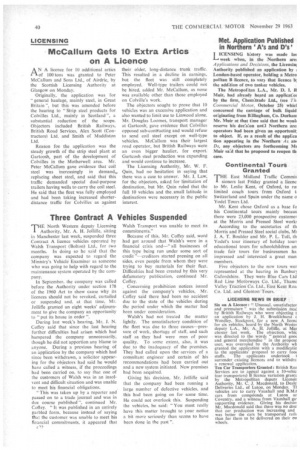Three Contract A Vehicles Suspended
Page 42

If you've noticed an error in this article please click here to report it so we can fix it.
THE North Western deputy Licensing Authority, Mr. A. H. Jolliffe, sitting in Manchester last week, suspended three Contract A licence vehicles operated by Walsh Transport (Bolton) Ltd., for two months. In doing so he said that the company was expected to regard the Ministry's Vehicle Examiner as someone who was going to help with regard to the maintenance system operated by the company.
In September, the company was called before the Authority under section 178 of the 1960 Act to show cause why its licences should not be revoked, curtailed or suspended and. at that time, Mr. Jolliffe granted an eight weeks' adjournment to give the company an opportunity to"put its house in order ".
During last week's hearing, Mr. J. N. Coffey said that since the last hearing further difficulties had arisen which had hampered the company unnecessarily, though he did not apportion any blame to anyone. During a previous hearing of an application by the company which had since been withdrawn, a solicitor appearing for the objectors had said he would have called a witness, if the proceedings had been carried on, to say that one of the customers of Walsh was in an insolvent and difficult situation and was unable to meet his financial obligations.
"This was taken up by a reporter and passed on to a trade journal and was in due course published ", continued Mr. Coffey. "It was published in an entirely garbled form, because instead of saying that the customer was unable to meet his financial commitments, it appeared that
Walsh Transport was unable to meet its commitments."
Because of this, Mr. Coffey said; word had got around that Walsh's were in a financial crisis and—" all businesses of this type being run under some sort of credit "—creditors started pressing on all sides, even people from whom they were trying to buy materials for their fleet. Difficulties had been created by this very defamatory publication, continued Mr. Coffey.
Concerning prohibition notices issued against the company's vehicles, Mr. Coffey said there had been no accident due to the state of the vehicles during the period under which the matter had been under consideration.
Walsh's had not treated the matter lightly. The unsatisfactory condition of the fleet was due to three causes—pressure of work, shortage of staff, and such staff. as they had were men of poor quality. To some extent, also, it was due to the inadequacy of the premises. They had called upon the services of a consultant engineer and certain of his recommendations had been carried out and a new system initiated. New premises had been acquired.
Giving his decision, Mr. Jolliffe said that the company had been running a large number of defective vehicles, and this had been going on for some time. He could not overlook this. Suspending the vehicles, be said: "You must really have this matter brought to your notice a bit more seriously than seams to have been done in the past ".








































































































